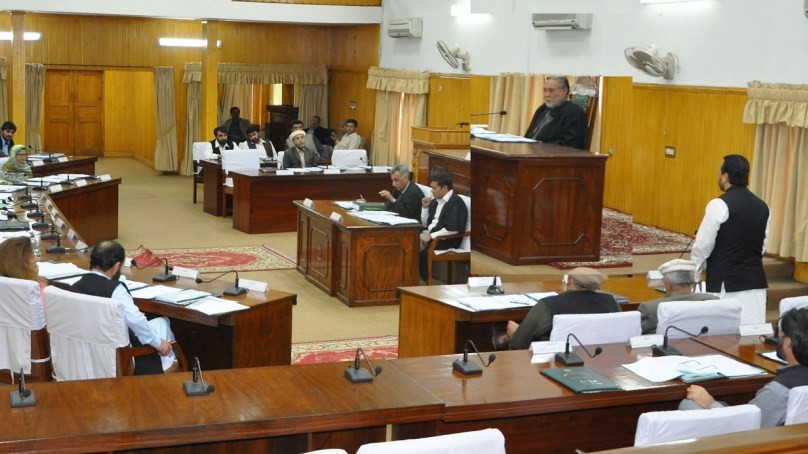
A long-awaited dream to revive old Silk routes and empower the people of Gilgit-Baltistan is about to come trueBy Ershad Mahmud

In a landmark decision, Prime Minister Shahid Khaqan Abbasi has reportedly decided to abolish the Gilgit-Baltistan Council and an official announcement for the upcoming setup is expected soon. All legislative, administrative and financial powers will be devolved to the Gilgit-Baltistan Assembly and the elected government of the region. The pronouncement is in line with the Pakistan Muslim League-N’s manifesto and political promises made during the election campaign in 2015 to end an era of disempowerment and political deprivation.
In 2010, the Gilgit-Baltistan Council was established by then Pakistan People’s Party’s government under the Gilgit-Baltistan Empowerment, and Self Governance Order 2009 whose headquarter was set up in Islamabad. It introduced a diarchy system of governance which could only be amended by the government of Pakistan. The council, with the prime minister of Pakistan in the chair, was meant to control critical strategic and financial affairs of the areas.
In this context, the Gilgit-Baltistan Council’s structure, functioning and role in the socio-economic uplift of Gilgit-Baltistan have invariably been subject to scrutiny. The existence of the council was quite controversial since its inception as it seized the key legislative, judicial, and administrative powers such as the appointment of the election commissioner, judges of the superior courts as well as the auditor general. The council has taken over 55 subjects wherein the elected government has no role to play. Some of them are critically important for the socio-economic development of the region such as hydropower generation, mineral and tax collection.
The popular demand for this area since ages has been its full-fledged integration into Pakistan as a fifth province. In this regard, Gilgit-Baltistan Assembly and All Parties Conferences have passed multiple resolutions at different points in time. The government of Pakistan was also very keen to make Gilgit-Baltistan the fifth province, particularly against the backdrop of China-Pakistan Economic Corridor.
To consolidate the public opinion of Gilgit-Baltistan and bring it to mainstream Pakistan, several options of integration were thoroughly explored and scrutinised. Chief Minister Gilgit-Baltistan Hafiz Hafeezur Rehman told TNS that nearly 19 high-level meetings were held to chalk out a viable strategy for giving representation to the people of the region in the National Assembly and Senate of Pakistan.
The current PML-N government in Islamabad and Gilgit had made a public pledge during election campaigns that if the party got elected, Gilgit-Baltistan would be given the rights enjoyed by all the provinces of Pakistan as well as Azad Jammu and Kashmir. Besides, the federal government would help the GB government initiate several mega projects so that people of this remote region can also lead a prosperous life.
The federal government formed a high-level committee under the leadership of Sartaj Aziz, deputy chairman Planning Commission, to consult all stakeholders and put forward some solid and doable suggestions so that Gilgit-Baltistan can be empowered. The findings presented in the committee report were quite startling as it stated that Pakistan’s case at the international level, and particularly in the United Nations Security Council, would be drastically damaged if Gilgit-Baltistan is made a province.
A semi-provincial political structure already exists in Gilgit-Baltistan since 2009 which can be enhanced by decentralising powers from Islamabad. The prime minister, who heads the council and enjoys huge financial and administrative powers, decided that he would relinquish his powers to empower the Gilgit-Baltistan government and the assembly. However, some members of the committee and senior bureaucrats opposed the prime minister’s decision.
Despite opposition, Prime Minister Shahid Khaqan Abbasi took a dramatic stance and stated that time has come to fully empower the people and the elected representatives of the region, an insider told TNS on condition of anonymity. In this way, a win-win situation has been created to address the aspirations of the people of Gilgit-Baltistan without harming Pakistan’s stance on Kashmir at international fora.
A new draft of reforms is in the pipeline which puts in place a more vibrant and confident government in the region. Under the new system, the Gilgit-Baltistan Assembly will be completely empowered, enjoying all the legislative and fiscal powers. Additionally, the government of Pakistan has officially conveyed to the governments of Gilgit-Baltistan that they would be non-voting members of the National Economic Council (NEC), Executive Committee of National Economic Council, the National Finance Commission Award, and Indus River System Authority (IRSA).
This news of abolishing Gilgit-Baltistan Council and the empowerment of the region has gone down very well in all segments of society. Although some of the people still do not believe that decision-making authority can be given to the people of the region, it is widely expected that the new structure of governance will be able to cater to the needs and aspirations of the local people in a better way. More financial and human resources will be at the disposal of the GB government, and the complicated system of decision-making will no longer exist. Therefore, fast track developmental projects can be initiated in the area, mainly in the fields of mountain tourism, hydropower generation and trade with the bordering provinces of the neighbouring countries.
This decision will lay to rest the ongoing campaign against the CPEC by certain countries who do not consider the entire Jammu and Kashmir but only Gilgit-Baltistan a disputed area. It goes without saying that Islamabad does not afford a simmering discontent in the area which is a gateway from China’s Xinjiang province to Pakistan’s Gwadar in Balochistan, connecting Pakistan with the Central Asian states.
A long-awaited dream to revive old Silk routes through Pakistan’s northern part now seems feasible. Interestingly, Gilgit-Baltistan is situated at the junction of four neighbouring countries -- the Wakhan Corridor of Afghanistan to the north, a narrow strip of territory in north-eastern Afghanistan that extends to China and separates Tajikistan from Pakistan, the Xinjiang region of China to the east and northeast, and the Indian-held Jammu and Kashmir to the southeast.